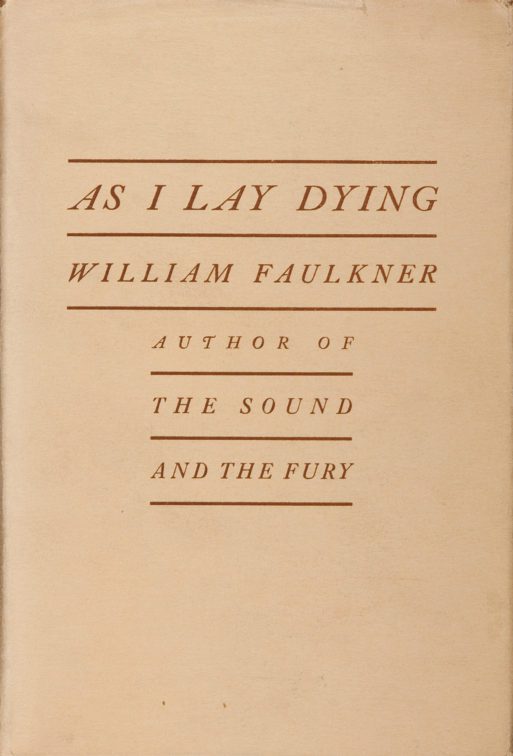 Faulkner was a “Southern” writer, in the vein of Flannery O’Connor, but like O’Connor, his works tend to speak to larger themes. His third novel, As I Lay Dying, concerns a relatively simple set of events: the death of the Bundren family matriarch, and their difficult subsequent journey through the countryside to bury her body. But by cycling through the perspective of 15 distinct narrators, and employing a stream of consciousness prose that ranges from colloquial to near-incomprehensible, Faulkner takes an at once profound and pedestrian premise and, filtered as it is through the consciousnesses of these very different characters, shows us a veritable kaleidoscope of deep-seated responses to a defining moment; a host of lessons can be learned, just as easily as none at all. A single death provides the author a vehicle for encapsulating a microcosm of life.
Faulkner was a “Southern” writer, in the vein of Flannery O’Connor, but like O’Connor, his works tend to speak to larger themes. His third novel, As I Lay Dying, concerns a relatively simple set of events: the death of the Bundren family matriarch, and their difficult subsequent journey through the countryside to bury her body. But by cycling through the perspective of 15 distinct narrators, and employing a stream of consciousness prose that ranges from colloquial to near-incomprehensible, Faulkner takes an at once profound and pedestrian premise and, filtered as it is through the consciousnesses of these very different characters, shows us a veritable kaleidoscope of deep-seated responses to a defining moment; a host of lessons can be learned, just as easily as none at all. A single death provides the author a vehicle for encapsulating a microcosm of life.
Set in the same fictional county in which Faulkner would place many of his novels, Yoknapatawpha County in Northwest Mississippi in the 1930s, it quickly becomes clear that this is not an altogether happy family. The dying woman Addie is a proud and bitter person. She has few loving words for her children or husband, and they have little for her (or any of each other, for that matter). As her last wish, Addie asks that she is buried near Jefferson, the county seat, about 30 miles north of the Bundrens’ farm, so that she can be with her family, that is, her birth family. Immediately following her death there is some discussion as to whether they will follow her wishes at all. They are in the midst of a rainstorm, and it will be a difficult journey by wagon across muddy roads and uninhabited country. But, partly thanks to the selfish motives of a few, such as those of father Anse, who wishes to purchase a set of false teeth in Jefferson, and daughter Dewey Dell, who is pregnant and wishes to find a doctor to perform an abortion, the Bundrens agree to carry out Addie’s wishes, even though none of them seems to understand why. And, even at the book’s finish, neither does the reader. Love alone clearly is not the motivation. Some innate sense of honor? A respect for the dead? To indulge their selfish motives? The family does not speak strongly enough collectively to say.
This is a deceptively complex work, and there could be, and indeed has been, much discussion on Faulkner’s intended message. But, to take what is perhaps the very simplest, we can acknowledge that the death of Addie, a person who was at best respected and at worst feared, loved and hated at the same time, causes these sorts of questions to come up. It forces at least a few of the characters to wonder what is truly important — and if they don’t wonder, than they can wonder at the fact that they aren’t wondering. Anse’s first reaction following Addie’s death is relief that he will finally have an excuse to go purchase the set of false teeth. But he seems to know that this shouldn’t be enough: “I have done things but not better or worse than them that pretend otherlike, and I know that Old Master will care for me as for ere a sparrow that falls. But it seems hard that a man in need could be so flouted by a road.” As if he feels guilty for not feeling as much remorse as he thinks that he should. Darl, one of the older sons and something of a well-known town enigma, is a grudging accomplice on the journey, and becomes an active and even dangerous impediment near the book’s conclusion, as if in protest against his own family’s selfishness and hypocrisy, although he can never argue that he is acting any more righteously.
The more I think about this book, what I keep coming back to is a rich and simple and almost unhappy acceptance of life as it is, forced upon the characters, and the reader, by the long-expected event of death. Everyone concerned will show a truth about themselves. Something in their inner nature will come out. Apparently, according to Faulkner, death has a way of doing that to you.

 As I Lay Dying, by William Faulkner
As I Lay Dying, by William Faulkner


 The Other Death in the Family
The Other Death in the Family

 The Healing Sound of Singing Bowls
The Healing Sound of Singing Bowls














